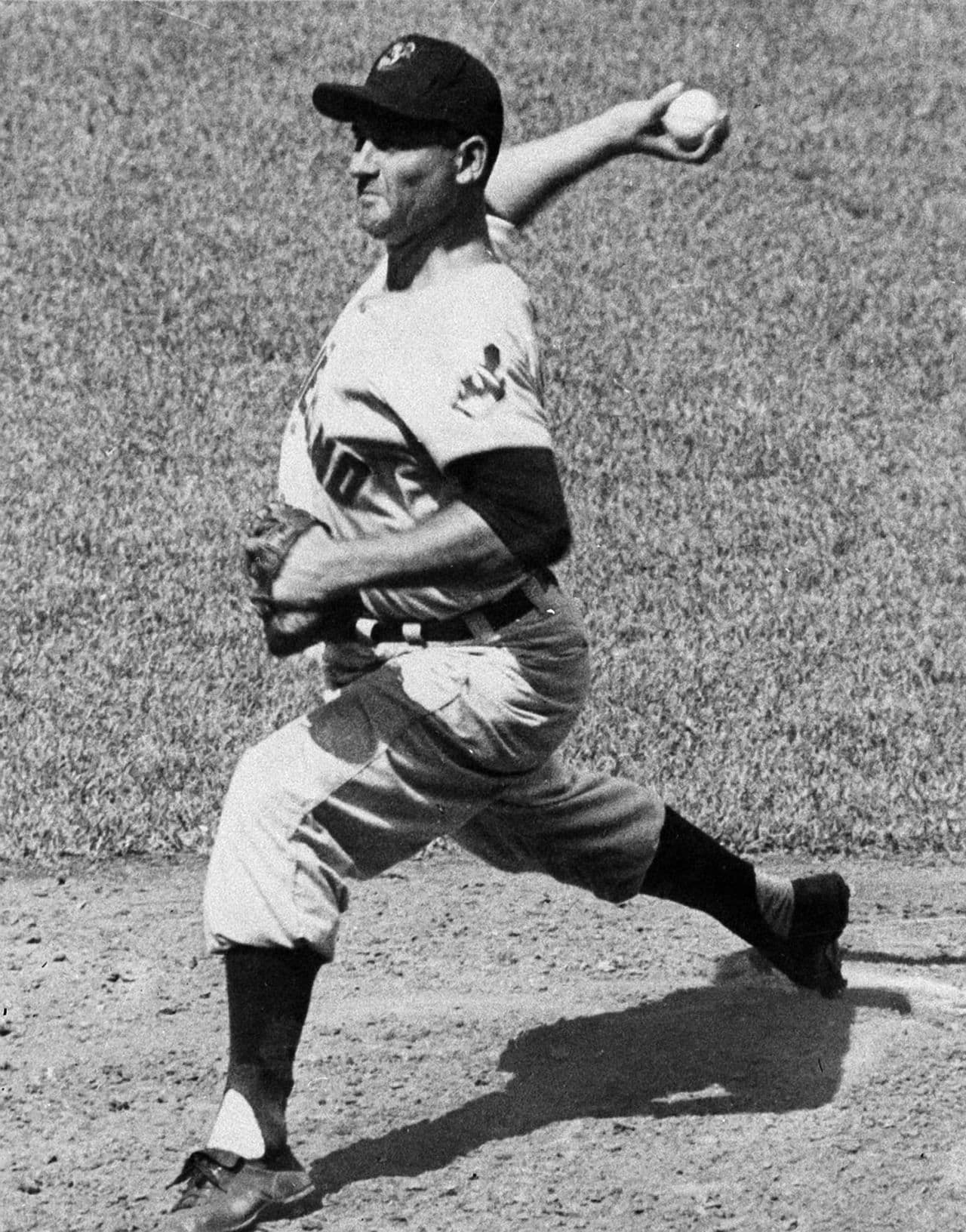Advertisement
#KilltheWin: An Attack On A Flawed — But Historic — Statistic
Resume
"We cite statistics because we believe they have value," says Brian Kenny of MLB Network, "because we believe there’s a correlation between the statistic and the physical act."
Kenny is the author of the forthcoming book, "Ahead of the Curve," and he’s attacking one particular statistical measure: the win, as it’s credited to a pitcher. Pitchers who last five innings and leave with a lead get the win — as long as their team doesn't later relinquish that lead. (Starting pitchers who last less than five innings are out of luck in that regard, but relief pitchers who simply manage to be in the game when their teams take the lead may get credited with a win… as long as one of the other guys in the bullpen doesn’t blow that lead later on, in which case that guy will get the win if his team goes in front to stay.)
Got it?
"We think a win goes to the pitcher who pitches well or very well, and only occasionally has some hard luck and doesn’t get the win," Kenny says. "And I’ve actually studied this, and that’s not the case."
The Case For #KillTheWin
Quantification was important to the evolution of baseball from a game played by boys to a game played by men and a game read about by men.
John Thorn, MLB's official historian
With that contention, Brian Kenny and the analytics analyzers in his camp are trying to #KilltheWin. Exhibit A — or at least Exhibit Recent — for the prosecution is what happened to Dodgers pitcher Clayton Kershaw last weekend when he faced the Mets.
"Sunday Night Baseball, and it’s a national game on ESPN," Kenny explains. "Everybody’s watching. He went seven-plus innings. I think he had 10 strikeouts, no walks. He had given up a solo home run, so he has a 2-1 lead."
To make what Kenny considers an outrageous story short, after Kershaw left that game with that one-run lead, the Dodger pitcher who relieved him gave up the lead, then got credit for the win when the Dodgers scored later and won the game.
"And it’s not fair to Clayton Kershaw that in terms of the win-loss record at the end of the year, when we say he’s 16-9, that Sunday night performance vanishes," Kenny says. "It does not exist."
The History Of The Win
Perhaps the logic of Kenny’s challenge is clear, but he and his like-minded colleagues are battling history. John Thorn, Major League Baseball’s official historian, traces the tradition of crediting pitchers with wins back almost 130 years, to the 1880s.
"By this time, most Major League staffs consisted of at least two pitchers, and in some cases three," Thorn says. "So separating the team victory by pitcher seemed a good thing to do. No one at this point was worried about a multiplicity of pitchers in a game and who do you give the victory to."
The man who introduced the idea that a pitcher should get credited with a team’s win was Henry Chadwick. To the great dismay of those who still believe in the myth of Abner Doubleday, Chadwick is often called the father of the game.
Maybe it’s five years, maybe it’s 10 years. It’s already diminished to the point where it’s not cited as a main statistic. And anybody knows at MLB Network when they bring it up in my presence, they’re gonna get 'the look.'
Brian Kenny, MLB Network
"Chadwick was a British-born sports writer," Thorn says. "Came to this country when he was 13 and had enormous influence on the game in trying to establish baseball as a model sport for America, akin to cricket in England. And he innovated the box score. Quantification was important to the evolution of baseball from a game played by boys to a game played by men and a game read about by men."
Chadwick’s stats have mattered. Players and their agents have used wins, batting average, RBIs and so on to argue for raises. And the milestones associated with those statistics have mattered a great deal, especially to players approaching them. Three hundred wins by a starting pitcher makes an excellent argument for inclusion in the Hall of Fame. Among the 24 pitchers who’ve won that many games is Early Wynn. He finished the 1962 season with 299 wins, which meant if he was going to get No. 300, he’d have to drag his 43-year-old body into a 23rd season.
Wynn's 300th Win
"The man suffered from gout and he was probably 240 pounds," says former New York Times sports columnist George Vecsey. "And it hurt him to put on his shoes. It hurt him to walk to the team bus."
Vecsey began his career as a sports writer in 1961. In 1963, he learned firsthand how important the accumulation of 300 wins was to Early Wynn. In the late spring of that year, the Cleveland Indians, apparently desperate for pitching, signed the old fellow. In July, still stuck on 299 wins, Wynn started a game against the then-woeful Kansas City Athletics.
"And he managed to hobble through five innings," Vecsey says. "He left with the lead, and they brought in a relief pitcher, Jerry Walker. And Jerry Walker held on, pitched the final four innings for the victory."
And that victory was credited to Early Wynn, since he’d gone the requisite five innings, however painfully, and left the game with the lead.

So good on the old guy for hanging in there to win his 300th game, right? And what a great story. A story to be told by father as he and son gaze up at Early Wynn’s plaque in the Baseball Hall of Fame. The kind of story that gives the national pastime meaning beyond cold numbers, right?
"I guess so," #KilltheWin proponent Brian Kenny says. "Or the other way of looking at it is, maybe he could have retired with dignity. 'Cause, by the way, Early Wynn took a lot of grief. 'Oh, he’s just hanging on for the record.'"
The Uncertain Future Of The Win
Kenny believes that contemporary baseball fans will witness — if not the disappearance of the stat that meant so much to Early Wynn — at least its devaluation.
"Maybe it’s five years, maybe it’s 10 years. It’s already diminished to the point where it’s not cited as a main statistic," Kenny says. "And anybody knows at MLB Network when they bring it up in my presence, they’re gonna get 'the look.'"
"And what are they going to replace it with?" Vecsey says. "Some goofus statistic dreamt up by a 21-year-old with a slide rule? Please, leave the game alone."
Wins by a pitcher still makes sense to Vecsey, who is not excited by the revolution in baseball stats that threatens to relegate wins by pitcher – not to mention batting average - to the dustbin of the game’s history in favor of alternative measures, the abbreviations for which are xFIP, K/9, WHIP and SIERA.
"I see statistics thrown into stories that I don’t even know what they mean," Vecsey says. "It sounds like the designation for a submarine or a vitamin you’re supposed to take. And I’m saying, what are they talking about?"
Somewhere between the innovator who has no use for wins as the measure of a pitcher’s worth and the veteran who wishes the innovator would go away stands the historian. John Thorn’s not ready to erase from the box score the line that identifies each game’s winning pitcher.
"I don’t think so. I think it’s here forever," Thorn says. "And I think it’s like batting average. Everyone recognizes that batting average is not the best indicator of offensive ability, but it’s traditional. And it does no harm. The only harm that’s done is if you think that it is the gold standard and you need to look at nothing else."
Hurrah for John Thorn’s broad view. I think he’s right. Baseball has endured the greed of itinerant owners and gamblers, lockouts, strikes, drug scandals and commissioners asleep at the switch. The coming and going of stats probably won’t lay a glove on the good, old game, which is likely to lumber along as it has for about a century and a half, no matter how the next generation of 21 year olds decide it should be quantified.
This segment aired on June 4, 2016.
